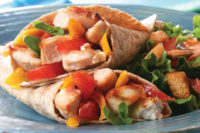In a melting-pot city like Chicago, Greek restaurants abound, and the Greektown neighborhood puts on yearly festivals that attract thousands of visitors in a grand celebration of Old World culture and cuisine. In other words, it was a perfect place for a Greek entrepreneur to start up a business manufacturing a beloved food item from his home. From those humble origins, Kronos Foods has grown to produce a variety of foods — covering meat, dairy and breads — that are enjoyed by consumers across the country.
Kronos Foods was founded by Chris Tomaras in 1975, when the gyro was just beginning to appear in American restaurants. They were being produced by chefs in Chicago, but the quality was very inconsistent. Tomaras developed and marketed the first GyroKones, which are pre-formed cones of gyro meat that can be heated on a vertical broiler and sliced on an as-needed basis by the foodservice operators. Interest in the GyroKone quickly took off, and Kronos Foods was on track for success.
Tomaras sold the business in the 1990s, and he continues to give back to the Greek community as a philanthropist. While he is no longer active in Kronos Foods, a couple of decisions he made early on have paid long-term dividends.
“Chris understood that the key to success long term was developing a network of distribution that would allow you to sell your products nationally,” explains Mike Austin, CEO. “We’re fortunate today that we have a really comprehensive national network of distributors who are capable of delivering products to both foodservice and retail customers on a daily and weekly basis.”
Kronos Foods, since its inception, also has put a focus on quality and consistency, which continues to the present day. With expansion into the retail market and now producing everything from gyro meat to pita bread and hummus, consumers have learned to associate anything with the Kronos brand as a high-quality product. The company is now the largest foodservice manufacturer of Mediterranean food in the country.
Focus on the flavor
Kronos has been located in Glendale Heights, Ill. since 2009. The building was a foodservice distribution center, and the company spent a year to renovate it to USDA specifications. After all the construction, it totals 210,000 square feet in size. Around 200 employees work here.
Kronos Foods produces about 100,000 pounds of chicken, beef and lamb products daily. Much of that is gyro meat, but the company also produces items like Italian beef and chicken shawarma. The facility also has a bakery that produces a variety of flatbread items like pitas and pizza dough and a dairy that makes tzatziki sauce and yogurt.
Every product in Kronos’ repertoire is made to be flavorful. Austin points out that today’s consumers are looking for flavor in their entrees.
“That’s not to say that ‘hot’ is where it is, it is to say that they like flavor,” he adds. “I don’t know where else you can get more flavorful products than if you look around the Mediterranean, in all the different countries and the different products that are produced there. “
Kronos Foods has long been a diverse company. Tomaras added a one-line bakery not long after its start in order to produce pita bread. Kronos was able to widely expand its portfolio with the acquisition of Rain Creek Baking Co., a Madera, Calif., bakery that specializes in fillo desserts. Baklava is one of the company’s best sellers.
|
FACT BOX
Kronos Foods Inc.
Glendale Heights, Ill.
Founded: 1975
Products Manufactured: Gyros, pita bread, tzatziki sauce, Italian beef, hummus, other Greek/Mediterranean foods
Markets: Foodservice and retail, nationwide
Along with its headquarters in the Chicagoland area, the company operates a bakery in California that produces fillo dessert products.
|
“Over time, we have added other fillo products as well as a commercial bakery [there],” Austin says.
Kronos is always looking for the next best-selling product, which keeps the company’s R&D team busy.
“We have a great research and development staff, headed by Nick Spondike, who is our executive chef and our director of research and development,” Austin notes.
One of the latest Kronos creations is an Italian beef, a staple of any sandwich shop in the Chicagoland area. Austin points out that many of the restaurants that serve Kronos gyros also sell Italian beef, so it was an area the company has considered for several years.
“After spending some time with our customers, we found that there was a place for consistently high-quality Italian beef product,” he says.” We were fortunate in 2012 to add an Italian beef line to the plant here. We probably sold our first pound of Italian beef in June of this year, and we’ve been very pleased with the results.”
The development of the beef product took about 18 months, and the construction of the Italian beef manufacturing line was a six-month process. After being distributed initially to Kronos’ foodservice customers the product has done so well that the company is working on introducing it to the retail market. Austin admits there were concerns about taking a Chicago food staple like Italian beef and marketing it elsewhere, but the demand for it has been strong and nationwide.
“It’s a matter of having a branded product that both the foodservice operator and consumer understand and be able to deliver that product to them, and we’ve been able to do that,” he says.
The success of that product, as well as every other Kronos product, has come down to quality raw materials, processing expertise and just the right mix of spices and seasonings.
“In conjunction with Chef Nick, we’ve been able to develop unique flavors that we add to a great piece of meat that we start with to produce a product that a consumer can really relate to and sink their teeth into, so to speak,” Austin notes.
Outside of the protein sector, Kronos offers a Greek yogurt, capitalizing on that trend at the dairy department. The company originally added a dairy with the thought of producing yogurt to use as a base for its tzatziki sauce, a traditional yogurt- and cucumber-based dressing used to top Greek salads or gyros.
“We are a Grade A-certified dairy, and we produce yogurt for our internal use, but we also produce it for external use in the foodservice market,” Austin says. “We also sell yogurt through a number of club stores throughout the country in large-format containers.”
Austin notes that it wasn’t necessarily easy for the company to add on yogurt production, but it was a logical move.
“Our name is Kronos, and we’re pretty well known as a Mediterranean food supplier. When you put ‘Greek’ in front of ‘yogurt,’ obviously you make it a Mediterranean product,” he says.
Finding new markets
Austin has been with Kronos Foods for 10 years and has been in the food industry since 1970. He was familiar with gyros, having traveled to Chicago often for industry events, but he knew they weren’t widely available in other parts of the country where he had lived.
“There was a great opportunity to take a great flavor to all 50 states,” he said. “It was a remarkable challenge to take a product that I knew by brand name and move it from something that was considered a Chicago product to being a national brand. “
The distributor network that Kronos Foods had developed helped to grow the company’s reach, but so did entering new market segments. Ten years ago, the company did not have a large presence, but now it has a number of products available at both supermarkets and club stores. Along with gyro components, such as tzatziki sauce and pitas, consumers can also buy a gyro kit that provides all the fixings in one package. Greek specialties like spanakopita and tyropita are available as well. The company also is looking at catering as a potential growth area.
“We’ve taken our product, and we try to find applications so that everyone can use it,” Austin explains. “We have products that catering can take and use at fine hotels for appetizers. We have Italian beef sandwiches that can be sold at foodservice and also at retail and club stores. We have developed unique packaging that allows our products to be more accessible to more consumers in more places, and we’re pretty excited about that.”
New products will continue to expand the company’s Mediterranean portfolio. Kronos has been making hummus for four years, and it has been well-received by foodservice and retail customers alike. Given the growing popularity of hummus, the company believes it has strong potential.
Austin adds that chicken shawarma has received an extraordinary response since it was released, particularly at retail. Traditional shawarma involves fresh cuts of meat and a robust blend of spices like coriander, cardamom, cumin, mace and cinnamon. The preparation is a time-consuming process, but the Kronos shawarma provides the same delicious dish at a fraction of the preparation time.
“We think that product, and other products that are similar to it in flavor profile — which may involve other proteins — has a great place in our future,” says Austin.
Not everything in Kronos’ product line may involve protein, but they all have two things in common. First, they all represent aspects of Mediterranean cuisine. Second, they all are full of flavor.
“You really know you’re eating something,” Austin says of his company’s offerings. “It’s not a mundane, flavorless product.”













Report Abusive Comment